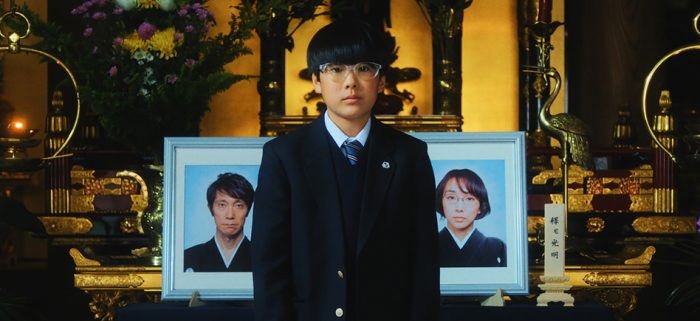'We Are Little Zombies' Review: Pop Video Game Mayhem That's Hard To Resist [Sundance]
Sometimes, a movie comes along that's so jarring, so visually explosive, and so utterly madcap that you can't help but fall in love with it, even if you don't quite like it. We Are Little Zombies is one of those films. Writer/director/composer Makoto Nagahisa is the mad scientist behind this concoction, which plays out like someone plugged a fever dream directly into a console video system, and then set it on fire. I don't think it entirely worked for me, but god damn it, I had fun watching it.
Tragedy is what sets this whacked-out tale of friendship in motion. Four 13-year-olds – Hikari, Ikuko, Ishi, and Takemura – meet one day at a crematorium as their dead parents are being reduced to ash and bone. The four have never met before, but they're immediately bonded together by a common trait – they don't know how to show emotion. None of them cried in the wake of their parents deaths, and they don't seem entirely broken up over the deaths. This lack of feeling causes the teens to brand themselves "little zombies" and strike out on their own. The little zombies wander about a bit before finally forming a band – a band called Little Zombies, of course. They cut a song which doesn't sound even slightly catchy, but somehow becomes a hit.
Hikari is our narrator, of sorts, bringing us into the world of the little zombies. He's obsessed with video games, and as a result, the world the characters inhabit will occasionally pixelate to look like an old game, or even flat-out turn into a flip-screen overhead perspective game a la The Legend of Zelda. It's just one of the many stylistic choices Nagahisa employs. Others include surrealist backdrops, dreamy color correction, and – most noticeable of all – a kind of frenetic, hyper-violent type of editing that will turn some off while capturing the attention of others. The camera can never sit still, and neither can the camera angle, or frame. While characters are having a simple conversation, Nagahisa will quick-cut from extreme close-ups of their eyes, mouths, hairlines before jumping back to a wide-shot and then coming right back in close again. It's as if the film itself, in attempt to et into the headset of its teen characters, has developed ADHD.
The filmmaker developed the concept of Little Zombies from a rather grim source. He cites a news report bout a group of teens who committed mass suicide, and it made him begin thinking about "children who lived without hope." This inspired him to concoct a film in which lonely, isolated, hopeless teens come together to create music. And indeed, music plays a huge part in the film. Not just in the tunes the Little Zombies cook up, but the soundtrack itself, which is mostly 8-bit music that sounds ripped directly from classic Nintendo video games.
"I have used everything I have cultivated in life for We Are Little Zombies," director Nagahisa said. "The film is like a music festival I have curated with all my favorite actors, musicians and artists. It may be a bit hectic but I hope it touches the heart of those who are crouching in dark rooms alone."
Saying We Are Little Zombies is "a bit hectic" is a bit of an understatement, and yet, as Nagahisa's passion project exploded across the screen, I found myself giving my heart to it. It's in dire need of trimming – at a full 2 hours, the movie drags. And it can sometimes be hard to get a feel on the tone of the narrative, which bounces from hilarious comedy to far darker territories. The comedy works far better than the dramatic elements. As the film opens, we hear Hikari say: "Today, mommy turned to dust. Daddy, too. Dusty as parmesan on a plate of Bolognese." This unfolds over the image of a smokestack belching out the earthly remains of Hikari's parents, and to underscore it all, an image of a plate of cheesy pasta pops up over the smokestack. How can you not immediately be charmed by a movie that opens like that?
/Film rating: 7 out of 10

